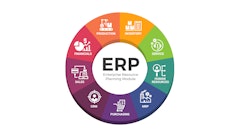Automaker using rugged mobile computers from Symbol to improve worker productivity, reduce costs; also, Gen 2 certification
Holtsville, NY — September 20, 2005 — Automaker DaimlerChrysler is using an enterprise mobility solution from Symbol Technologies within its Kassel plant in Germany to reduce costs and improve worker productivity, the solution provider has reported.
DaimlerChrysler is using Symbol's MC9000 rugged mobile computers and Mobility Services Platform (MSP) to capture, move and manage data collected during various stages of the production cycle, including the delivery of material, warehousing and shipment of axles for commercial vehicles.
"We selected Symbol mobile computers for their robustness, ease of use and flexibility to install our own applications," said Karsten Götze, partial project leader WLAN Infrastructure within the SAP Automotive project at DaimlerChrysler in Kassel. "The Symbol MC9000 has significantly enhanced the efficiency of DaimlerChrysler's staff. For the first time, a DaimlerChrysler plant is using a single mobility solution within their complete production cycle."
Replacing Manual Processes
The facility, which produces axles for commercial vehicles, gathers large amounts of data about production, storage of products, shipping and receiving and delivery of finished products. Counting and labeling every screw, grommet and axle by hand was a costly and time-consuming process for DaimlerChrysler, and Symbol's rugged mobile computers have helped to shorten this process by collecting data and wirelessly transferring it via a secure wireless LAN to a printer.
All applications on the MC9000 are directly connected to DaimlerChrysler's SAP Automotive System via the Mobisys Solution Builder, an SAP-certified add-on tool for Symbol mobile computers. In addition, a Symbol Mobility Services Platform (MSP) agent is embedded in the MC9000 mobile computer, helping to address the growing challenges associated with deploying, managing and maintaining a mobile enterprise. DaimlerChrysler can now automatically manage, deploy and install new applications on all Symbol mobile computers and remotely test the devices, saving time and operational costs associated with manual testing, according to Symbol.
"DaimlerChrysler implemented Symbol's enterprise mobility solution because they fulfilled all of our requirements for a technology partner, providing continuous service and support from purchase decision through deployment, as well as a 'future-proof' Windows-based platform that can easily integrate with a wide variety of applications we are currently using now and plan on using in the future," said Götze. "In addition, the Symbol MC9000 mobile computers are also rugged enough for our usage in a production plant — withstanding drops to concrete floors and outside influences like dust particles in the air."
Gen 2 Certification for RFID Reader
Elsewhere, Symbol announced that auto-ID standards body EPCglobal has certified the XR400 radio frequency identification (RFID) reader from Symbol as compliant with the Generation 2 (Gen 2) standard.
Certified by testing group MET Laboratories, the XR400 RFID reader also offers dense reader mode performance, which reduces interference between the XR400 and other readers operating in close proximity, and is a required function for Gen 2 readers, Symbol said.
"A key issue for customers migrating from Gen 1 to Gen 2 protocols will be how the reader performs near multiple readers," said John Bruno, senior vice president and general manager of RFID at Symbol Technologies. "Symbol is proud to offer customers the promise of minimal interference and investment protection with the multi-protocol XR400 reader."
Testing was conducted by MET Laboratories, an independent testing laboratory, under conditions that comply with rules set forth by the EPCglobal Hardware Certification Program. New customers deploying the XR400 reader will now see the EPCglobal Hardware Certification Mark, indicating that the product has been tested and will work according to EPCglobal standards, such as the UHF Generation 2 Air Interface Protocol standard ratified in December 2004.
Symbol said that the Windows CE-based XR400 reader is currently deployed in a range of application scenarios, including inventory management in retail warehouses and outlets; baggage tracking in airports; and "build-to-order" manufacturing processes that correspond with data routed from the reader.
Additional Articles of Interest
— RFID technology has the potential to change the way supply chains are managed, but in order to be effective businesses need to take a holistic look at the deployment. Read more in the SDCExec.com article "Time for RFID: Applying RFID in the Supply Chain."
— Eugene McCabe, architect of Sun Microsystems' Customer Fulfillment in Transit process, discusses the challenges and rewards of taking links out of the company's supply chain in "Anatomy of the 'Zero Touch' Supply Chain," in the August/September 2005 issue of Supply & Demand Chain Executive.
— Hard data and sophisticated planning are key when goods and materials start flowing upstream through the reverse supply chain. Read more in "Meeting the Reverse Logistics Challenge" in the June/July 2005 issue of Supply & Demand Chain Executive.
Holtsville, NY — September 20, 2005 — Automaker DaimlerChrysler is using an enterprise mobility solution from Symbol Technologies within its Kassel plant in Germany to reduce costs and improve worker productivity, the solution provider has reported.
DaimlerChrysler is using Symbol's MC9000 rugged mobile computers and Mobility Services Platform (MSP) to capture, move and manage data collected during various stages of the production cycle, including the delivery of material, warehousing and shipment of axles for commercial vehicles.
"We selected Symbol mobile computers for their robustness, ease of use and flexibility to install our own applications," said Karsten Götze, partial project leader WLAN Infrastructure within the SAP Automotive project at DaimlerChrysler in Kassel. "The Symbol MC9000 has significantly enhanced the efficiency of DaimlerChrysler's staff. For the first time, a DaimlerChrysler plant is using a single mobility solution within their complete production cycle."
Replacing Manual Processes
The facility, which produces axles for commercial vehicles, gathers large amounts of data about production, storage of products, shipping and receiving and delivery of finished products. Counting and labeling every screw, grommet and axle by hand was a costly and time-consuming process for DaimlerChrysler, and Symbol's rugged mobile computers have helped to shorten this process by collecting data and wirelessly transferring it via a secure wireless LAN to a printer.
All applications on the MC9000 are directly connected to DaimlerChrysler's SAP Automotive System via the Mobisys Solution Builder, an SAP-certified add-on tool for Symbol mobile computers. In addition, a Symbol Mobility Services Platform (MSP) agent is embedded in the MC9000 mobile computer, helping to address the growing challenges associated with deploying, managing and maintaining a mobile enterprise. DaimlerChrysler can now automatically manage, deploy and install new applications on all Symbol mobile computers and remotely test the devices, saving time and operational costs associated with manual testing, according to Symbol.
"DaimlerChrysler implemented Symbol's enterprise mobility solution because they fulfilled all of our requirements for a technology partner, providing continuous service and support from purchase decision through deployment, as well as a 'future-proof' Windows-based platform that can easily integrate with a wide variety of applications we are currently using now and plan on using in the future," said Götze. "In addition, the Symbol MC9000 mobile computers are also rugged enough for our usage in a production plant — withstanding drops to concrete floors and outside influences like dust particles in the air."
Gen 2 Certification for RFID Reader
Elsewhere, Symbol announced that auto-ID standards body EPCglobal has certified the XR400 radio frequency identification (RFID) reader from Symbol as compliant with the Generation 2 (Gen 2) standard.
Certified by testing group MET Laboratories, the XR400 RFID reader also offers dense reader mode performance, which reduces interference between the XR400 and other readers operating in close proximity, and is a required function for Gen 2 readers, Symbol said.
"A key issue for customers migrating from Gen 1 to Gen 2 protocols will be how the reader performs near multiple readers," said John Bruno, senior vice president and general manager of RFID at Symbol Technologies. "Symbol is proud to offer customers the promise of minimal interference and investment protection with the multi-protocol XR400 reader."
Testing was conducted by MET Laboratories, an independent testing laboratory, under conditions that comply with rules set forth by the EPCglobal Hardware Certification Program. New customers deploying the XR400 reader will now see the EPCglobal Hardware Certification Mark, indicating that the product has been tested and will work according to EPCglobal standards, such as the UHF Generation 2 Air Interface Protocol standard ratified in December 2004.
Symbol said that the Windows CE-based XR400 reader is currently deployed in a range of application scenarios, including inventory management in retail warehouses and outlets; baggage tracking in airports; and "build-to-order" manufacturing processes that correspond with data routed from the reader.
Additional Articles of Interest
— RFID technology has the potential to change the way supply chains are managed, but in order to be effective businesses need to take a holistic look at the deployment. Read more in the SDCExec.com article "Time for RFID: Applying RFID in the Supply Chain."
— Eugene McCabe, architect of Sun Microsystems' Customer Fulfillment in Transit process, discusses the challenges and rewards of taking links out of the company's supply chain in "Anatomy of the 'Zero Touch' Supply Chain," in the August/September 2005 issue of Supply & Demand Chain Executive.
— Hard data and sophisticated planning are key when goods and materials start flowing upstream through the reverse supply chain. Read more in "Meeting the Reverse Logistics Challenge" in the June/July 2005 issue of Supply & Demand Chain Executive.
- More articles about EPCglobal.
- More articles about Symbol Technologies.

![Pros To Know 2026 [color]](https://img.sdcexec.com/mindful/acbm/workspaces/default/uploads/2025/08/prostoknow-2026-color.mduFvhpgMk.png?auto=format%2Ccompress&bg=fff&fill-color=fff&fit=fill&h=100&q=70&w=100)



![Pros To Know 2026 [color]](https://img.sdcexec.com/mindful/acbm/workspaces/default/uploads/2025/08/prostoknow-2026-color.mduFvhpgMk.png?ar=16%3A9&auto=format%2Ccompress&bg=fff&fill-color=fff&fit=fill&h=135&q=70&w=240)








